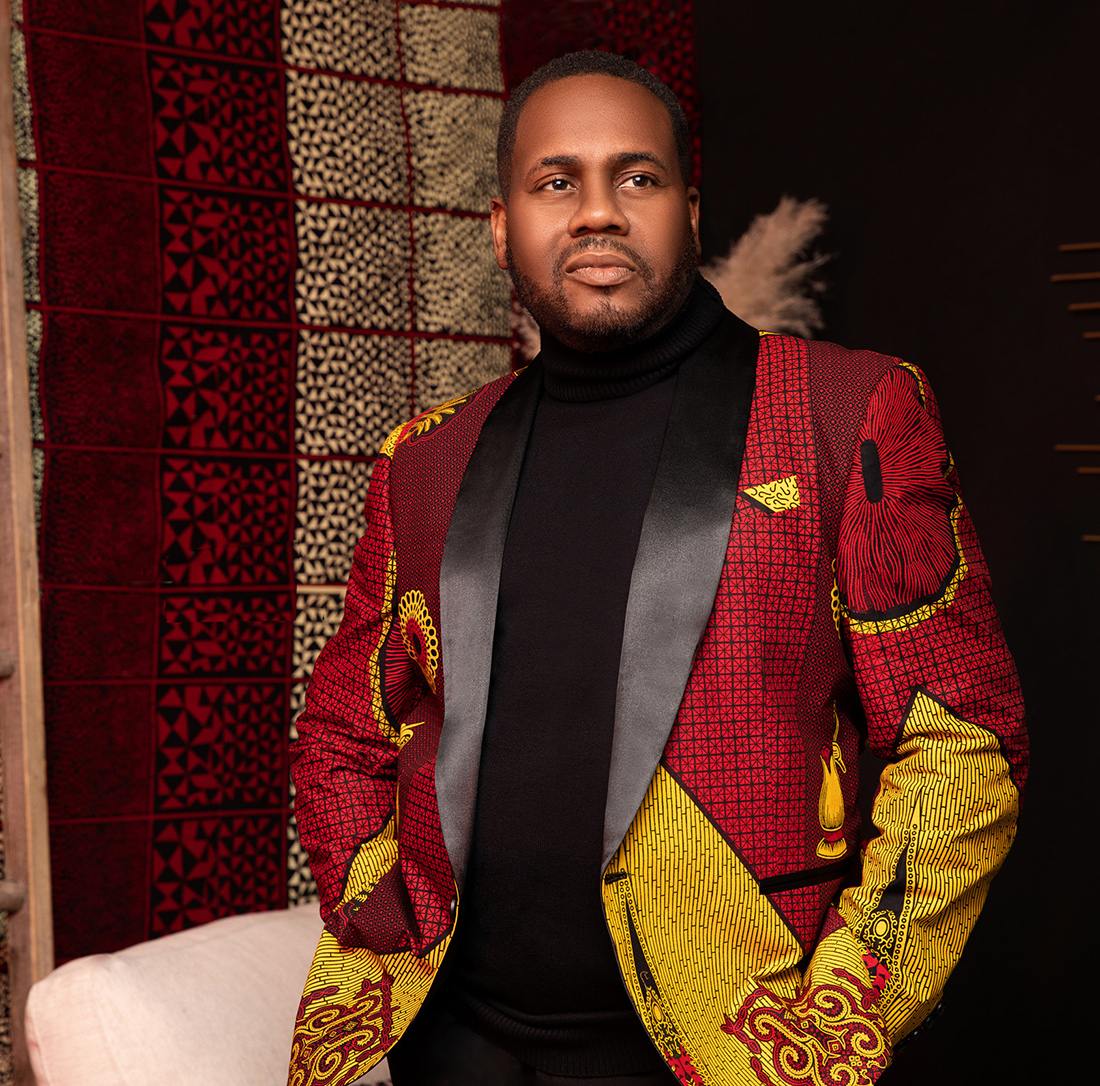This marks the 300th regular season concert in our 30 year history!
Kenneth Overton is lauded for blending his opulent baritone with magnetic, varied portrayals that seemingly “emanate from deep within body and soul.” Kenneth Overton’s symphonious baritone voice has sent him around the globe, making him one of the most sought-after opera singers of his generation. Kenneth is a 2020 GRAMMY award winner for Best Choral Performance in the title role of Richard Danielpour’s The Passion of Yeshua with the Buffalo Philharmonic Orchestra and Chorus, conducted by JoAnn Falletta.
Mr. Overton’s program for us is a celebration of American Music, including spirituals, classical art songs and selections from The Great American Songbook.
I, Too, Sing America!
Spiritual (arr. Dave Ragland): Steal Away
H. Leslie Adams (b. 1932): Selections from Night Songs
Prayer
The Heart of a Woman
Night Song
Margaret Bonds (1913-1972):
Three Dream Portraits
Minstrel Man
Dream Variations
I, Too
Florence Price (1887-1953):
To My Little Son
Song to the Dark Virgin
— Intermission —
Spiritual (arr. Leo Edwards): Joshua Fit De Battle of Jericho
William Grant Still (1895-1978):
Grief
Parted
Adolphus Hailstork (1941):
My Heart to Thy Heart
Invitation to Love
Harry T. Burleigh (1866-1949):
Deep River
De Gospel Train
Just You
Duke Ellington (1899-1974) (arr. James Davis Jr.): Heaven/Come Sunday, from Sacred Songs
Selections from The American Songbook will be announced from the stage.
Program is subject to change
Notes by Joseph Gusmano
Spiritual (arr. Dave Ragland): Steal Away
Dave Ragland is an American composer, vocalist, and pianist from Chattanooga, Tennessee. He has been nominated for four Emmys, and he has composed music for theater, opera, and ballet. Ragland is the artistic director of Inversion Vocal Ensemble, a regionally touring vocal collective that has performed with Brandi Carlisle and Tanya Tucker. They have also sung at the National Civil Rights Museum, the National Museum of African American Music, the Ryman Auditorium, and the Tennessee Arts Academy. Ragland made his operatic debut with Nashville Opera in their 2013-2014 production of David Lang’s The Difficulty of Crossing a Field.
Steal Away comes from a music and dance collaboration between Ragland and the choreographer Shabaz Ujima. This work pushes opera narratives in a new direction, reimagining African American spirituals in a way that affirms and centers Black joy. This piece is a resetting of a traditional spiritual composed sometime before 1862 by Wallace Willis, who was enslaved by a Choctaw freeman in the Western territories. Alexander Reid, the minister at a Choctaw boarding school, heard Willis singing this tune and transcribed the words and melodies. Reid sent this arrangement to the Jubilee singers at Fisk University in Nashville, who helped popularize the spiritual. Ragland, who is very musically active in Nashville, works as a collaborative pianist at Fisk University.
H. Leslie Adams (b. 1932): Selections from Nightsongs
Prayer
The Heart of a Woman
Night Song
H. Leslie Adams is an American composer from Cleveland, Ohio. He has received commissions from the Cleveland Orchestra, Cleveland Chamber Orchestra, Prague Radio Symphony Orchestra, Iceland Symphony Orchestra, and several other prominent orchestral and chamber groups around the world. He was resident composer for the Rockefeller Foundation in Bellagio Italy and Yado Resident in Saratoga Spring, NY. Adams has also held teaching positions at Florida A&M University, Stillman College, and the University of Kansas. In addition to his vast collection of vocal and symphonic works, he also composed a set of Twenty-Six Etudes for Solo Piano.
The three selections being performed today, from Adams’s Nightsongs, take their text from several prominent Harlem Renaissance poets and playwrights. Prayer comes from a Langston Hughes poem that was first published in the periodical Buccaneer in 1925. The text for The Heart of a Woman was written by Georgia Douglass Johnson, one of the first African American women to make a successful career as a playwright. The final piece, Night Song, takes inspiration from Clarissa Scott Delaney who worked as a social worker, educator, essayist, and poet who was a tireless advocate for the well-being of young black children.
Margaret Bonds (1913-1972): Three Dream Portraits
Minstrel Man
Dream Variation
I, Too
Margaret Bonds is another composer and educator who had deep roots in the Harlem Renaissance. She is well known for her arrangements of spirituals and she frequently collaborated with Langston Hughes. She grew up in her mother’s home in Chicago, which was frequented by prominent American composers like Florence Price and Will Marion Cook. She found work as a composer, performer, and arranger for vocalists around Chicago and New York City. Bonds studied composition at Northwestern University and even performed as a pianist with the Chicago Symphony Orchestra.
Dark and lyrical, Three Dream Portraits are evocative settings of three Langston Hughes poems. Bonds has a delicate sense of melodic shape, and her harmonies twist into unexpected, lush textures. The works explore the gentle power of the baritone vocal range with ease, effortlessly extracting the mood of Hughes’s poetry. Though much of her professional background was spent arranging and performing popular music, these vocal pieces demonstrate the skill of a mature composer with great command over her instrument and style.
Florence Price (1887-1953):
To My Little Son
Songs to the Dark Virgin
Florence Price was a prolific composer of orchestral, chamber, vocal, and piano works. Born in Little Rock, Arkansas, Price would go on to pursue a degree at the New England Conservatory and then work as an active composer in Chicago until her death. She is recognized as the first African American woman to have a work performed by a major symphony orchestra. Price initially tried to pass as Mexican, saying her hometown was Pueblo, Mexico, in order to avoid discrimination. She recently gained more prominence after a considerable number of her scores and other papers were found in her summer home in 2009. Price’s compositional voice blends the harmonic and textural sensibilities of late-Romantic music with folk music and spirituals.
To My Little Son is a setting of a poem by Julia Johnson Davis. Beneath a gentle crooning melody, Price blends lush, warm harmonies with more dissonant cadences, all while maintaining a delicate texture throughout the piece. Songs to The Dark Virgin is a more straightforward Romantic setting of a Langston Hughes poem with the same title. Price explores the deep thundering low range of the keyboard through most of the piece, but there is a moment where the texture cuts out entirely during the second recitation of the line “thou dark one.” Her command of the keyboard and her deep understanding of vocal music makes even short pieces like these incredibly impactful.
Spiritual (arr. Leo Edwards (1886-1978)): Joshua Fit De Battle of Jericho
Leo Edwards was a composer and pianist who worked on Broadway and Tin Pan Alley. He was born in Germany but moved to Brooklyn with his family in 1891. He worked as a staff composer for a small publishing company before he began composing music on Broadway. One of his most notable credits is as the composer for the 1902 production of The Wizard of Oz. He also arranged popular folk tunes and spirituals to sell on Tin Pan Alley.
This song is a well-known spiritual composed by an unknown slave or slaves during the first half of the 19th century. The lyrics reference the Battle of Jericho, during which Joshua, Moses’s successor, led the Israelites in a fight against Canaan. Slaveowners would not allow slaves to learn how to read, but this rule would generally be relaxed when it came to religious education. People living under slavery were inspired by the stories of the Israelites, as they saw slaves violently resist their masters and other adversaries. These spirituals became rallying cries of hope that could be sung right under the oppressor’s nose.
William Grant Still (1895-1978):
Grief
Parted
William Grant Still was an American composer who wrote over 200 works, including five symphonies, four ballets, nine operas, and over thirty choral works. He was known as the “Dean of Afro-American Composers” and is the first American composer to ever have a work performed by the New York City Opera. Still also arranged music for film and composed music for the 1939 World’s Fair in New York City. The piece, Song of a City, played continuously at one of the exhibitions. His orchestral works have been performed by major orchestras including the Berlin Philharmonic, the London Symphony Orchestra, the Tokyo Philharmonic Orchestra, and the BBC Orchestra.
Grief was first performed in 1955 and is a setting of a poem by LeRoy V. Brant. When this piece was first published, the vocal score included an error on the very last note. Instead of ending on a consonance, the vocal part comes to rest on a rather dissonant note. A correction to the score wasn’t introduced until 2009 when Still’s daughter found the original copyright. Parted is the third song in his song cycle Songs of Separation. The text comes from a poem by Paul Laurence Dunbar and offers a cynical perspective on marriage and divorce.
Adolphus Hailstork (b. 1941):
My Heart to Thy Heart
Invitation to Love
Adolphus Hailstork is an American composer who was born in Rochester, NY and lived for much of his life in Albany, NY. As he grew up, Hailstork studied violin, piano, organ, and voice and eventually went on to study composition at Howard University in Washington, D.C. He also studied with Nadia Boulanger at the American Conservatory in Fontainebleau. He studied and taught at Michigan State University and is the Composer-in-Residence at Virginia’s Norfolk University. Hailstork’s music blends African and European musical styles to reflect his own heritage.
My Heart to Thy Heart is a setting of another poem by Paul Laurence Dunbar. The piece begins with a flurry of notes in the piano that serve as the foundation for a soaring melody. Invitation to Love comes from a collection of vocal pieces, Four Romantic Melodies. This song is of a much gentler quality than the first. The melody is full of reserved emotion and the piano arpeggios ebb and flow as the texture builds throughout the piece.
Harry T. Burleigh (1866-1949):
Deep River
De Gospel Train
Just You
Harry T. Burleigh was an American pianist, composer, and vocalist who spent his life trying to create definitively American music. His grandfather was born a slave and had an exceptional voice. Burleigh and his younger brother learned spirituals from their grandfather, which would have a deep influence on the composer’s later output. He often produced classical arrangements of spirituals in order to spread black music to classically trained musicians. Burleigh famously introduced Dvořák to Black American music, which influenced the Czech composer’s orchestral music later in his life. The two met while Burleigh was working as a handyman for Frances MacDowell, the mother of the composer Edward MacDowell, in order to support himself through his studies at the National Conservatory of Music in New York. Dvořák heard Burleigh singing while he worked and asked him to sing for him. The composer was so taken with his voice that he incorporated the scales and melodies into his “New World” symphony and his “American” String Quartet.
Deep River and De Gospel Train come from Burleigh’s collection of vocal music titled Jubilee Songs of the USA. These pieces were composed for the Jubilee Singers, an acapella group at Fisk University that worked tirelessly to promote black music. Just You is a simple but effective love song that showcases Burleigh’s tender compositional voice, shaped by both classical and folk musical traditions which creates a sound all his own.
Duke Ellington (1899-1974) (arr. James Davis Jr.): Heaven/Come Sunday from Sacred Songs
Duke Ellington is one of the most well-known composers of the Harlem Renaissance. He gained national prominence as a bandleader at the famous Cotton Club in New York City. Ellington wrote or collaborated on over a thousand works. He is a monumental figure in the jazz world, and many of his pieces continue to be standards in big band and small combo repertoire around the world. Interestingly, Ellington and many of his contemporaries were resistant to the term “jazz” instead preferring the term “Black American Music” or simply “beyond category.” Though he his most well-known for his dancefloor-ready secular music, these two pieces show off Ellington’s more religious and contemplative side.
Heaven is a slow ballad that is both gentle and haunting. The vocal melody is prominent, where the piano delicately ornaments and punctuates each phrase. This piece comes from the 1968 album Second Sacred Concert. Come Sunday was originally written as the first movement of a suite entitled Black, Brown, and Beige. The original composition had no lyrics and was meant to showcase the saxophonist Johnny Hodges. It wasn’t until Ellington edited the piece in 1958 that he included lyrics for the gospel singer Mahalia Jackson.
Kenneth Overton, baritone
Kenneth Overton is lauded for blending his opulent baritone with magnetic, varied portrayals that seemingly “emanate from deep within body and soul.” Kenneth Overton’s symphonious baritone voice has sent him around the globe, making him one of the most sought-after opera singers of his generation. Kenneth is a 2020 GRAMMY AWARD WINNER for Best Choral Performance in the title role of Richard Danielpour’s The Passion of Yeshua with the Buffalo Philharmonic Orchestra and Chorus, conducted by JoAnn Falletta.
He appeared in On Site Opera’s The Road We Came, an immersive and site-specific experience that explores the composers, musicians and places that define the rich Black history of New York City through a series of self-guided, musical walking tours. He also sang the title role in Porgy and Bess for New Orleans Opera as well as A Night of Black Excellence with Fort Worth Opera and this past summer, Nadia Boulanger and Her World with the Bard Music Festival.
Previously, he made a triumphant role début of Friar Lawrence in Roméo et Juliette with Oregon Bach Festival; performing on the 150th anniversary of Berlioz’s death and conducted by the irreverent John Nelson, critics deemed the production “too beautiful, too musical” not to be performed. Whilst at the festival, he also performed Mozart’s Requiem and Bach’s Magnificat. In addition, he returned to San Francisco Opera for Billy Budd, performed in Porgy and Bess with Harrisburg Symphony, and performed in Union Avenue Opera’s 25th Anniversary Gala. In concert, he appeared at Carnegie Hall for Angela Rice’s Thy Will be Done and Vaughan Williams’ Dona nobis pacem, Mechem’s Songs of the Slave with Symphony of the Mountains, and with the Oregon Bach Festival for Richard Danielpour’s Passion of Yeshua which he also sang at UCLA’s Royce Hall as well as the Buffalo Philharmonic which was recorded for release on Naxos.
Mr. Overton is quickly becoming a champion of new works, returning to San Francisco Opera in “the most eagerly anticipated new opera of the season”; the World Premiere of John Adams’ Girls of the Golden West. He also created the role of Ralph Abernathy in the World Premiere of the Rhythm & Blues opera I Dream by Douglas Tappin for Opera Grand Rapids, Toledo Opera, and Opera Carolina and performed the role of Stephen Kumalo in Kurt Weill’s Lost in the Stars for Union Avenue Opera.
Previous engagements also include Amonasro in Aida with Boheme Opera, a return to The New York City Opera performing the role of Jake Wallace in Puccini’s La Fanciulla del West, and Sharpless in Madama Butterfly for Opera Idaho. Additionally, Kenneth thrived in his Hungarian debut as the title role in Porgy and Bess in the Margaret Island Open Air Theatre’s production where he was heralded as one of “America’s most renowned Opera singers.”
Alongside the New England Symphonic Ensemble, Kenneth took Carnegie Hall by storm in his soloist performances of Faure’s Requiem and the New York Premier of Michael John Trotta’s Seven Last Words of Christ with Mid America Productions. In addition, he returned to David Geffen Hall with the National Chorale in Mozart’s Requiem, and Vesperae Solennes de Confessore. He also starred in the significant World Premier of Upon This Handful of Earth by Norwegian Composer Gisle Kverndokk, commissioned by the New York Opera Society.
Kenneth’s ever blossoming career has allowed him to perform with some of the most prestigious Opera Companies and Orchestral Organizations in the world.
Walker Jermaine Jackson, Piano
Walker Jermaine Jackson, is a multi-versed musician in New York City. Primarily a classical tenor, he has performed throughout the US, as well as internationally in Austria, Greece, Germany, and Mexico. Outside of opera, he is becoming more known for his cross-over vocal work in jazz.
Also a pianist for over 20 years, Walker’s playing afforded him a full scholarship to Indiana University where he served as a graduate assistant and as an accompanist for the African-American Choral Ensemble. Walker works as a salon pianist and cabaret singer in Manhattan. He served as a collaborative pianist for the 2020 Harlem Opera Theater Competition. In 2021, he collaborated in a recital featuring the music of black women composers sponsored by Austin Opera.
In addition to performing, Walker is an avid educator. Specializing in adolescent voices, he coaches privately, offers group voice classes, and works professionally in the choral field as a group vocal technician in schools throughout Manhattan, Brooklyn, and the Bronx. He also teaches classes in music theory, harmony and keyboard skills, chart reading, and improvisation.
Walker holds a B.Mus. from the Cleveland Institute of Music in voice and Dalcroze Eurhythmics; a M.Mus. in voice from Jacobs School of Music at Indiana University, and a M.Mus. in Music Theory from the College- Conservatory of Music at the University of Cincinnati. He is also a graduate of the Interlochen Arts Academy.




